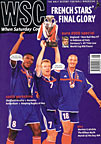 Gary Oliver looks at Airdrie, a middle-ranking Scottish club caught between the Premier League and oblivion
Gary Oliver looks at Airdrie, a middle-ranking Scottish club caught between the Premier League and oblivion
Airdrieonians manager Gary Mackay described Wednesday June 14 as his “worst day in 20 years of football”. From a man who spent most of that period playing for ill-fated Hearts sides, that is quite a statement. For Mackay, the miseries of losing titles, finals and semis were seemingly preferable to telling 27 of his 30 players that a liquidator had made them redundant.
Airdrie are the latest middle-ranking Scottish club to discover that, without a sugar daddy, it is impossible to sustain a Premier League set-up on First Division income. In recent seasons Partick, Falkirk and Raith have all been in intensive care, but Airdrie’s condition is the most serious so far. Not only is the club losing some £10,000 a week, it also owes a reported £500,000 for the building of the Shyberry Excelsior Stadium – one of only three grounds currently acceptable to the SPL – without yet having secured title from the local authority.
On February 1 Airdrie went into provisional liquidation (instigated by a company owned by Rangers’ David Murray). There was initially widespread concern for the plight of a historic club. But as the months passed and deadlines came and went, most Scottish fans and commentators struggled to stifle a yawn.
Distraught Airdrie supporters have been shockingly few in number. “Does the town deserve a senior football club?” asked Glasgow’s Herald newspaper when, after the hurriedly formed Save The Diamonds campaign had urged fans to turn out in force for the next home game, the attendance was a pitiful 1,566. The fans lost during the four seasons the team lodged with Clyde at Cumbernauld appear to have gone for good.
Those still attending have also despaired at events on the park, the team last season losing 21 of 36 games, form that in any other year would have brought relegation. Supporters who raised money by walking to the fixture at Falkirk endured the nadir of an 8-0 defeat, the players performing as though they too had just travelled 15 miles on foot.
Provisional liquidators KPMG did little to win hearts and minds, clumsily imposing pay cuts and crudely announcing that season tickets would no longer be valid. The remit of KPMG, though, was to protect creditors’ interests, not win popularity contests. In February, shareholders altered the club’s archaic constitution, apparently paving the way for Steve Archibald to take ownership of the club. Long regarded as a member of the awkward squad, for months he and Blair Nimmo of KPMG have been engaged in a tedious, and occasionally fractious, game of poker.
In his opening gambit Archibald intimated he was not willing to inherit debts and that a deal had to be done within a few weeks or not at all. Four months later, Blair Nimmo justified his release of all but three players by saying: “We are becoming concerned that Steve Archibald may not be in a position to deliver a solution.” All the more surprising, then, when on June 25 Archibald was quoted as saying he had agreed terms with all the preferential creditors and expected to be given the go-ahead by Nimmo following day.
He wasn’t. Instead it was revealed that KPMG had discussed with local rivals Motherwell their buying the stadium to establish an academy, with Airdrie becoming tenants. Fans of both clubs are suspicious of Motherwell chairman John Boyle, who has openly talked in the past of creating a single club for Lanarkshire.
“There will be no co-operation from me, ” was Steve Archibald’s blunt response. “I have my own plans.” Which do not include an arrangement that might prohibit Airdrie playing in the SPL. But if the single-minded Archibald has immediate promotion as his aim, he is unlikely to be re-signing many of those 27 hapless players.
From WSC 162 August 2000. What was happening this month